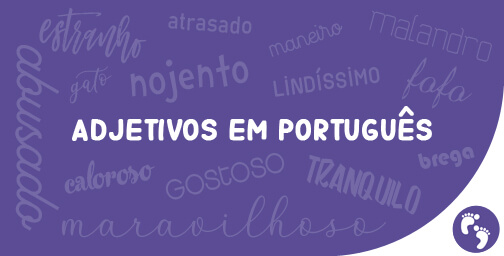Blog
20 Adjectives in Portuguese Every Beginner Must Know
- Wednesday January 31st, 2024
- Posted by: Amanda Ennes
- Category: Learn the Portuguese Language and Portuguese Grammar

When learning Portuguese, students might worry about verb conjugations and the right pronunciation. However, when coming to Brazil, we highly suggest you learn a few cool adjectives in Portuguese you can use daily.
We are sure you will be dying to say how beautiful the Cariocas are, how wonderful Rio de Janeiro beaches can be, and how tasty the Brazilian feijoada is. Therefore, learning adjectives in Portuguese can be an ace up your sleeve when expressing your feelings about Brazil or telling people about the incredible experiences you had in the Marvellous City.
Caminhos lists below a few cool adjectives every Brazilian Portuguese beginner must know!
Attention! Keep in mind that most adjectives have gender in Portuguese: they are either masculine or feminine, switching the last letter of the word when representing each gender.
1. Maneiro
Cariocas love to use this adjective to express how cool something or someone is!
Examples: Esta música é muito maneira! / Conheci um menino maneiro ontem. (This song is really cool! / I have met a nice guy yesterday.)
2. Malandro
We usually say most Cariocas are “malandros” by nature, especially the guys. The word “malandro” may have different meanings, depending on the context. In a bad way, someone is “malandro” if they do not like to work much, are always expecting friends to pay for their expenses, or do small non-ethical things to get what they want. On the other hand, “malandro” can also be a bohemian guy who loves the nightlife, especially samba parties, and really enjoys the company of pretty women — a true lady-killer.
3. Maravilhoso
Rio de Janeiro is known as Cidade Maravilhosa, the Wonderful City! Maravilhoso (masculine form; or “maravilhosa” for the feminine form) is something that causes great admiration, wonder, and fascination. You can use this adjective in Portuguese when referring to places, people, food, art — basically, anything you really like or you think is awesome!
4. Caloroso
Brazilians are considered to be warm people. They get excited when meeting new people, they like to hug, kiss, and be affectionate even with people they are not that close to. They can also be very passionate about things they love, such as football teams. We use the adjective “caloroso” to describe this kind of enthusiasm.
Example: Hoje conheci uma família Brasileira e eles foram muito calorosos ao me receberem em sua casa. (Today I met a Brazilian family and they were very warm while welcoming me into their home.)
5. Gostoso
We can use the adjective “gostoso” to refer to people or food. When talking about food, you may use this adjective to express your feelings about a really tasty dish, fruit, dessert, etc.
When speaking about people, you need to be careful. You can use this adjective to talk about a sexy person who has a nice body. However, you may reserve this adjective to use with your significant other, someone you have some kind of intimacy with. It is very common in Brazil for guys to use this word to pick up girls on the street, but it is not something nice to do, it is impolite and rude.
6. Gato
As a noun “gato” is an animal, a cat. However, when speaking about people, this is slang to talk about people you think are attractive. Learn more about Brazilian slang.
7. Estranho
This adjective in Portuguese can be used for multiple things. Translating it to English, “estranho” means “weird”.
When people say someplace is “estranho“, means it is dangerous, a deserted place, somewhere you should not go.
When talking about people, you can use this word to refer to unusual individuals — even though the word carries a bad connotation, people do not always use it negatively; instead, they use it to describe someone unique and different from most people.
8. Atrasado
You must learn this adjective in Portuguese! You are going to use it a lot of times when talking about people from Rio de Janeiro and Brazilians in general. It means people that are not on time. Brazilians are never on time. Being 15 or 20 minutes late is very common for Brazilians. When talking about parties, Brazilians commonly exacerbate the situation — if a party is scheduled for 6 pm, they typically show up at 7 or 7:30 pm.
9. Fofo
Something or someone cute, sweet, childlike.
10. Nojento
You can use this adjective to say something is dirty and disgusting. You can also use this word to talk about people who have unacceptable behavior, but keep in mind that this is a way to scold them.
11. Cafona/Brega
You do not switch between feminine and masculine with these adjectives. People use them to describe something that is out of fashion, no longer worn, and no longer considered pretty at present, fashion-wise.
12. Lindíssimo
“Íssimo” is a suffix in Portuguese largely used by Brazilians to intensify the meaning of an adjective. “Lindo” is one of the adjectives in Portuguese that can be used to express how beautiful something is. And the word “lindíssimo” is widely used by Brazilians. As we are very intense people, we like to put things in a much bigger perspective. In the end, if we really like something, we tend to make it seem like the said thing is much better than it really is.
13. Abusado
This Brazilian Portuguese adjective means people that go beyond what is reasonable or allowed. Typically, people use it as a bad adjective, but friends can use it playfully.
14. Tranquilo
Someone or something calm and peaceful. It is very common to use this adjective to refer to a person who is easygoing and pleasant to be around. You can also use this adjective to talk about a calm place, with not so many people around.
Example: Eu realmente gostei da praia da Reserva, é uma praia muito tranquila. (I really enjoyed Reserva Beach, it is a very quiet beach.)
15. Foda
Be aware of how, when, and where you are going to use this adjective. This is a curse word in Portuguese. But people widely use it. As an adjective, “foda” expresses something that is really really really cool. Use this to express unique amazing experiences, really incredible people, and places that are out of this world!
Read more: Be Aware: Bad Words in Portuguese.
16. Quente/Frio
The Portuguese adjectives “quente” and “frio” translate to “hot” and “cold” in English, respectively. However, when expressing personal feelings of being hot or cold, Portuguese speakers typically use the phrases “estou com calor” and “estou com frio“, instead of saying “estou quente” or “estou frio” in this context. So, while people can use “quente” and “frio” to describe the general temperature of something, like food or the weather, they do not commonly use them to express personal feelings of being hot or cold.
17. Animado
People often use it to describe someone or something full of energy, enthusiasm, or excitement. When applied to a person, it indicates a lively and spirited demeanor. When referring to an event or atmosphere, it suggests a dynamic and lively atmosphere. “Animado” can convey a positive and vibrant mood, and it is commonly used in social contexts to express a sense of liveliness or excitement.
18. Ansioso
It is used to describe a state of nervousness, restlessness, or anticipation. It means someone is experiencing a heightened sense of eagerness or nervousness, often related to future events or expectations. Depending on the context, it can convey both positive anticipation, such as eagerness for a positive outcome, or negative anticipation, such as anxiety about something uncertain or worrisome.
19. Chato
“Chato” translates to “annoying” or “boring” in English. It is commonly used to describe someone or something that causes discomfort, irritation, or a sense of tediousness. When referring to a person, it suggests that the individual is bothersome or tiresome to be around. Additionally, it can be used to express dissatisfaction with a situation or task that is perceived as dull or irritating.
20. Flopado
“Flopado” is a slang term in Brazilian Portuguese that originates from the English word “flop.” It is often used in the context of entertainment to describe something that has failed or did not meet expectations. In this context, “flopado” refers to a project, idea, or performance that did not succeed or was not well-received by the audience. It is a colloquial way of expressing disappointment or lack of success.
If you want to learn more about adjectives in Portuguese and other language tips, please check our tag Learn Portuguese Language and Portuguese Grammar for great articles.
Caminhos Language Centre is the largest and most exciting Portuguese school in Rio de Janeiro, Brazil. We have an excellent infrastructure, over 15 experienced Brazilian teachers, and a friendly multilingual support staff. We are the only school in Brazil able to offer Portuguese group courses throughout the year on 10 different levels. Moreover, our school also offers more than just Portuguese lessons for foreigners, we offer you the complete Rio de Janeiro experience. Every day we organize 100% free and fun activities for you to socialize and practice your Portuguese. We can also help you with a student visa for Brazil and accommodation in Rio de Janeiro. Follow us on Instagram for some Portuguese tips and news.


 Deutsch
Deutsch Français
Français Português
Português Español
Español




